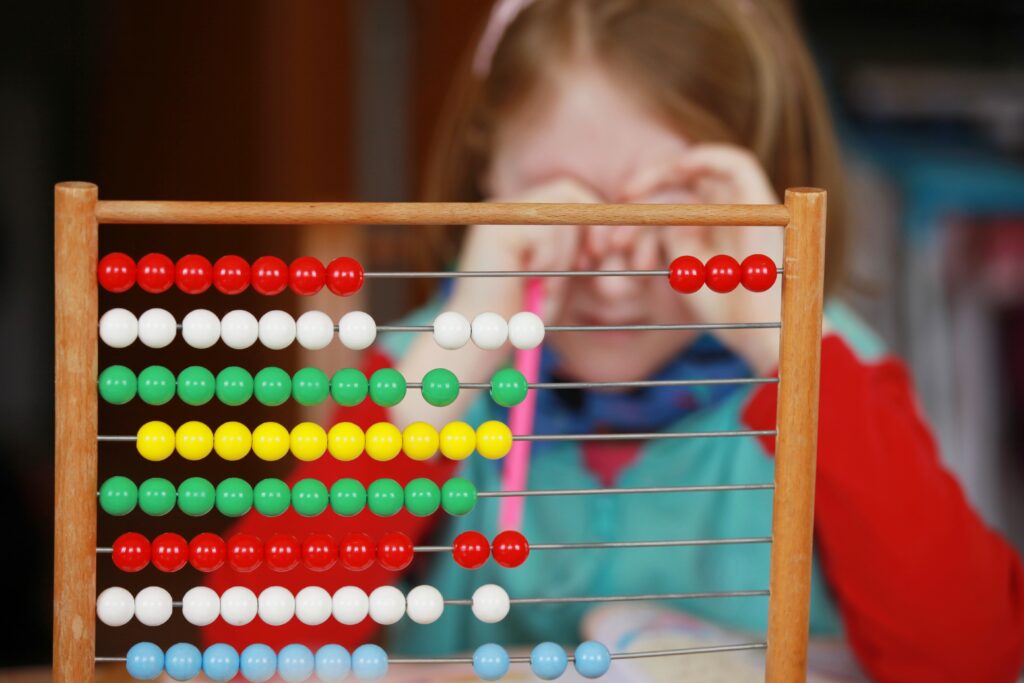
There are school subjects that simply suit some children more than others. Only a few students excel in every single subject. Every child has his or her own personal strengths and weaknesses, and that's perfectly fine.
But up to what point can you actually say that your offspring simply don't like a subject or a topic? At what point should you, as a parent, become alert and question whether there might not be something more behind it?
Mathematics, in particular, is one of the subjects in which classes often split into a very good group and one with great difficulties. If your child belongs to the latter group, he or she may have dyscalculia, which you should investigate together.
If your child suffers from dyscalculia, it means that he or she has great difficulty in dealing with mathematical facts. This is a Learning Disorderwhich you may already know under the name "dyscalculia". It usually manifests itself already in childhood.
However, there is also another form of dyscalculia, known as acalculia. Unlike normal dyscalculia, this is acquired. It can be the result of a stroke, for example, and therefore usually only occurs in adulthood.
Various symptoms can give you helpful clues as to whether or not your child actually suffers from dyscalculia. In most cases, dyscalculia occurs at a very young age and becomes apparent as soon as your child has his or her first contact with mathematics.
It has problems perceiving numbers as quantity values and treating them accordingly. In short: It is difficult for him to realize what numbers express. He sees the digits much more as meaningless signs, which is why confusion and number spinning can occur. Therefore, your child solves even simple calculations only with difficulty and he needs more time for it than his classmates.
If the problems only crystallize when the mathematical demands become higher, dyscalculia is rather unlikely.

In addition to frequent number spinning and long math problems, there are several other symptoms that may indicate that your child has dyscalculia.
At kindergarten age, dyscalculia is often still hidden because contact with numbers is still quite low. However, attentive parents can already discover the first signs here. You should be alert if your child has problems counting things and repeatedly confuses ratios.
If the child learns the first units in elementary school, difficulties in dealing with them are a first possible indication. Since a child with dyscalculia often does not realize numbers as quantities but only sees them as symbols, it is also difficult for him or her to visualize what the difference is between a meter and a centimeter, for example.
This brings us to the topic of visual-spatial thinking, with which children with dyscalculia often also have problems. They then often also find it difficult to remember arrangements in a table. The further mathematics lessons progress, the faster learners with dyscalculia get confused. They confuse arithmetic operations and use their fingers or tally sheets as often as possible.
Dyscalculia not only causes problems in class, but also in everyday life. Your child may then find it difficult to read the clock. Digital clocks also bring it into the Broodingbecause it first has to pause for a moment and consider what the numbers mean in this context. Similarly, dealing with money becomes a challenge.
Why and how exactly dyscalculia develops has not yet been fully elucidated. However, studies have revealed that the brain regions of those affected that are responsible for arithmetic show reduced activity. Thus, dyscalculia does indeed appear to have a cognitive cause. This could also explain why children with dyscalculia often perceive numbers as meaningless signs.
Researchers assume that the weakness is based on a developmental or activity disorder. These in turn may be due to epilepsies or brain disorders in early childhood. Psychosocial and school didactic factors probably also play an important role.
Studies also suggest that dyscalculia is hereditary. Almost every second affected child has a relative with a learning disorder. Which gene might be responsible is not yet known. What researchers already know, however, is that genetic disorders such as Turner syndrome can also trigger dyscalculia.
If your child suffers from dyscalculia, he or she will need more support at school than other learners in order not to lose touch. So that you can help him in the best possible way, a medical examination is advisable first. The doctors will check which neurological deficits are associated with your child's dyscalculia. They will also conduct a standardized intelligence test to determine how severe the dyscalculia is. All of this provides an important basis for the next steps, which can be very individual.
But the most important thing is that you approach your child with understanding. He probably suffers more from his dyscalculia than he shows you. After all, he has to deal with setbacks every day and is constantly reminded that he has to work much harder than his classmates. This triggers frustration and anger.
Do not put pressure on your child. Reduce the pace of learning if you feel it is overwhelmed and talk to his teachers. If they don't know about the dyscalculia, they may blame the problems on inattention or laziness and form a bad opinion of your child - wrongly!
Make sure it celebrates a sense of achievement that gives it new Self-confidence give. These don't necessarily have to have anything to do with lessons. Successes in leisure time, for example in a sports club, show your child that he or she also has strengths. They give him Motivationto achieve something similar at school as well. Even small successes are worth their weight in gold. So praise even small steps forward and make sure your child stays motivated and doesn't shut down as soon as he or she feels overwhelmed. Learning coaching skills help you with this.
Maybe you know what it's like: Your child comes home, actually has a mountain of homework to do, but refuses vehemently. This is not necessarily because they don't feel like it. Just Children with a learning disability would at least like to bypass as much learning material as possible at home. You see no Sense in "wasting" their free time on this when they are doing everything wrong anyway. This poses a great challenge to you as a parent.
Now it's called: Patient remain. Such situations can quickly degenerate into quarrels and that is of course anything but conducive. Everlasting discussions about school and homework can make your Relationship and your child becomes more and more withdrawn. Then you can help him even less to cope with his dyscalculia. Make sure your child understands why he should do his homework. The point is not to make them feel bad, but to calmly remind them of everything they have learned in school.
Let your child first try to solve the tasks independently. If he or she has problems, then join in before he or she takes a completely wrong calculation path, has to start all over again, and frustration sets in. A good dose of motivation should also be provided. Build in small rewards when your child has mastered a task with flying colors. For example, they can stay up half an hour longer today or ask for their favorite dessert for dinner.
In the case of dyscalculia, support from parents and school plays a decisive role. Experts recommend seeking additional professional help. In an appropriate therapy, the experts will explain to you how you can help your dyscalculia. Child help them develop an understanding of quantities and numbers. They investigate which areas of the brain need to be stimulated and how, so that your offspring can build a connection,
For this purpose, the experts use various aids, such as building blocks or glasses. They use them to make numbers and quantities tangible and vivid. They build an important bridge between the apparently abstract numbers and the reality they represent.
However, even in therapy, dyscalculia cannot be cured. The goal is to compensate for the weakness and ensure that it holds your child back and limits them as little as possible.


